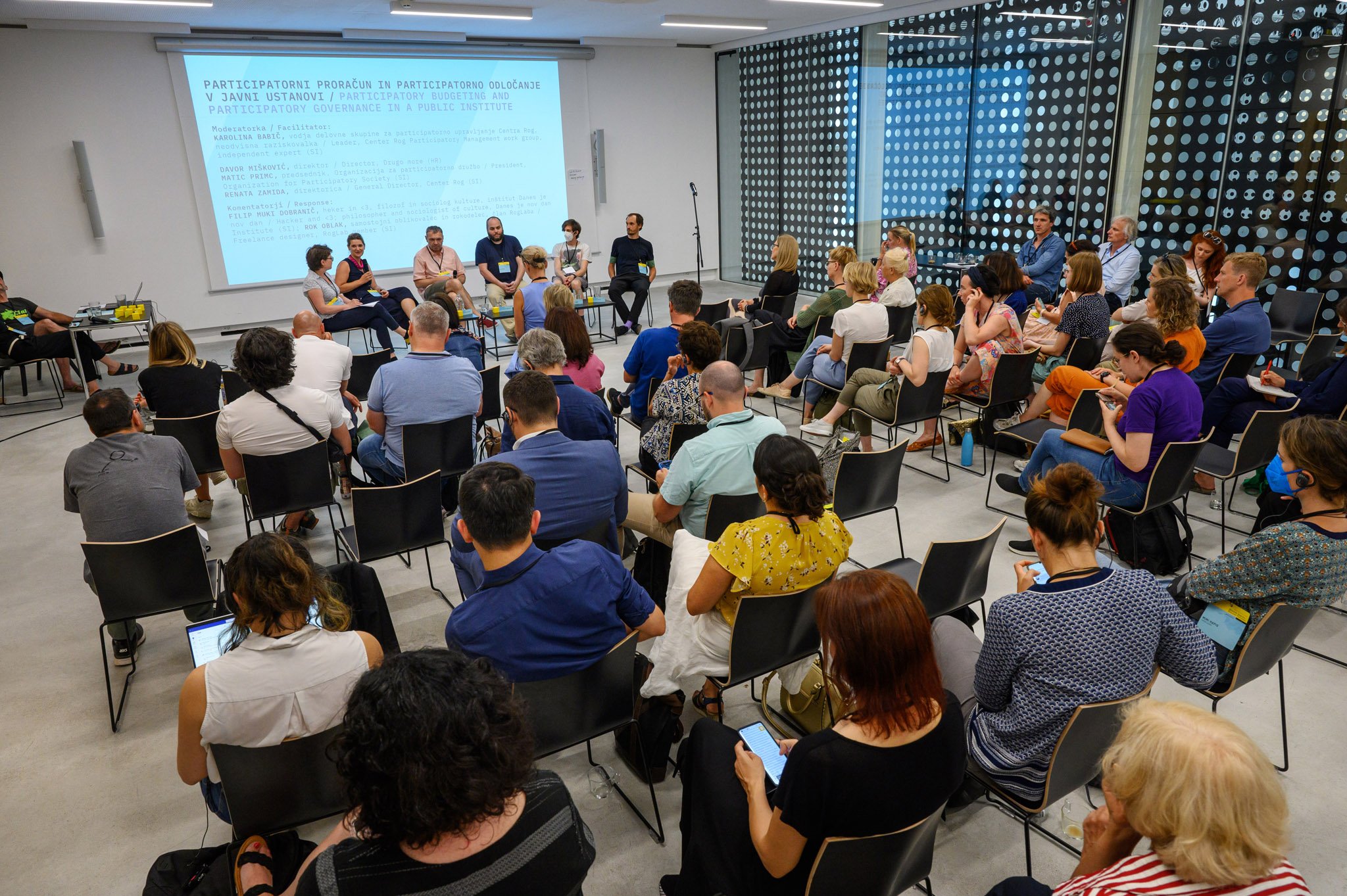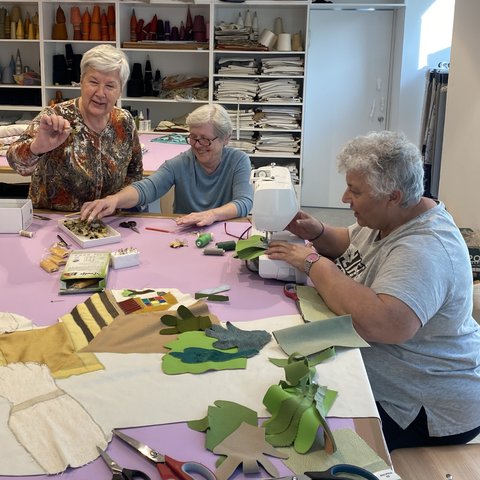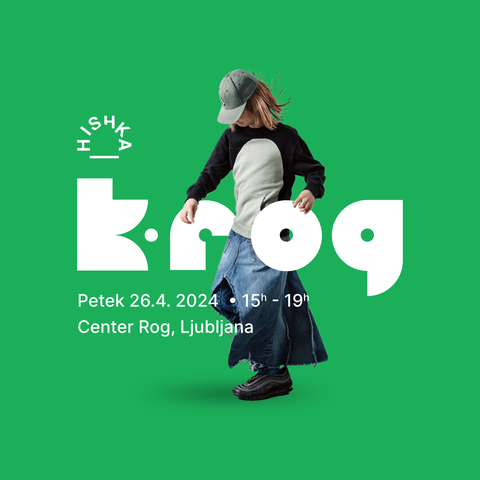Successful conclusion of the development project Shared Spaces – Shared Futures

An international conference that concluded the project Shared Spaces – Shared Futures took place on 16 and 17 June, organised by the Center Rog in Ljubljana. The project had been running from November 2021 and was co-financed by the European Cultural Foundation. Constructive public debate on five important areas (participatory public governance, creative ecosystems at a systemic level, inclusive uses of green spaces, integration of refugees and migrants, and equality and diversity), will contribute to the development of applicable solutions we wish to include in our future work at the Center Rog.
Work groups will complement documents in all fields with responses from foreign experts and commentators, and the Center Rog will implement the key guidelines and measures prepared in the form of pilot projects that will be improved based on responses from users.
The conference was attended by around one hundred participants, among them local and foreign experts, interested parties and the general public.
The first day of the conference, Thursday 16 June, opened with a round table discussion on Community Engagement for Sustainable Development, moderated by Meta Štular, Head of Strategic Development and Programmes at Center Rog. Serhan Ada, Director of the Cultural Politics and Management Research Centre at the Istanbul Bilgi University, Olga Alexeeva, Programme Manager at the European Cultural Foundation, Kate Armstrong, Board Member at the Fab City Foundation from Barcelona, Amina Omićević, Head of Solution Mapping at UNDP Accelerator Labs from Bosnia Herzegovina, and Igor Izotov, Head of Exploration at UNDP Accelerator Labs from North Macedonia, discussed how the extremely rapid social and environmental changes that we face in the 21st century demand that we find new ways of tackling the challenges awaiting us in the future. If we wish to reach sustainable developmental goals by 2030, we need to accelerate development and include the broader communities in decision making about global solutions. The round table discussion addressed various ways in which organisations tackle this challenge. Participants agreed that social innovation is at the very heart of sustainable development, that it is essential that production is transferred back to the local environment, and that a shift from extractive industries towards new production paradigms is necessary.
This was followed by a round table discussion on Participatory Budgeting and Participatory Governance in Public Institutions, moderated by Karolina Babič, independent researcher and advisor in the area of social and solidarity economies and lecturer in social economy. Together with panel members Davor Mišković from the Drugo More organisation from Rijeka in Croatia, Matic Primc, President of the Organisation for Participatory Society, Renata Zamida, Director of the Center Rog, Filip Muki Dobranič from the Institute Danes je nov dan, and Rok Oblak, designer and craftsman, presented proposals for the participation of users in the management of the Center Rog, such as the introduction of a participatory budgeting process, naming the representative members of the advisory body of the institution, and naming members of expert commissions. The group suggested specific ways and tools for participation and recommended digital support for the participation of members of the Center Rog, as well as models of training members and employees for implementing the participatory process.
The first day of the conference concluded with a round table on the Systemic Development of a Cross-sectoral Creative Ecosystem, moderated byMatevž Čelik, architect, researcher and cultural producer, Head of the European Architectural Platform LINA. Borut Cink, Policy Officer at New European Bauhaus, Sanja Grcić, President of the SOTO Association for Contemporary Textile Design and Clothing, Goran Forbici, President of the NGO centre CNVOS, Damjan Kavaš, researcher at the Institute for Economic Research, and Matej Feguš, Director of the company Donar d.o.o., discussed how to develop various kinds of sustainable financial support for the cultural and creative sector with an emphasis on the target areas of the Center Rog: maker culture, applied arts, design, urban crafts, architecture and engineering. The panel’s main conclusion was that, so far, Slovenia has not developed a model for a systemically targeted financial support of the cultural and creative sector but could, with the appropriate adjustment of existing financial programmes and tenders intended for entrepreneurship, remove the obstacles which prevent actors from the cultural and creative sector from accessing funds. The group also presented specific proposals for improvement which will serve the Center Rog as the basis of dialogue with decision makers at the national level.
The first event on the second day of the conference, Friday 17 June, was a round table on the Green Spaces of the Center Rog, led by Urška Jurman, who works in the field of contemporary art and spatial culture. As an introduction she presented the findings of the work group and the results of discussions with surrounding residents. With guests Stuart Connop, Associate Professor in Sustainability at the University of East London’s Sustainability Research Institute, and Nienke Sluimer, urban planner and advisor at STIPO – the Amsterdam group for urban development, and with contributions by the architect and artist Marjetica Potrč and landscape architect Gaja Trbižan, they considered ways of creative and prototype utilisation of green spaces in the Center Rog in accordance with the concept of sustainability and resilient ecosystems of the future and models of cooperation between the public cultural institution and the broader local community.
This was followed by a round table on the Integration of Migrants and Refugees, moderated by Romana Zajec, founder and programme director of the APIS Institute. Participants sought solutions for better understanding of the needs of migrants and refugees, and the possibilities of including these into the activities of the Center Rog. The work group presented the findings of their research which, through questionnaires, directly included 150 migrants and refugees. Guests, Furkan Güner, President of the association Intercultural Dialogue, Giovanna Paola Severino Gutierrez, President of the Latino American Association in Slovenia, Mimi Hapig, co-founder of the Habibi.Works initiative, Katarina Kromar, project manager at the association Odnos, and Aigul Hakimova, Head of the Gmajna Cultural Association, discussed the possibilities of greater social integration of vulnerable target groups as tools of social cohesion. Representatives of migrant groups especially stressed that they are looking forward to being able to share the knowledge and skills of their own cultures with the local population. They applauded the plans by Center Rog to give migrant and refugee populations a greater visibility and affirm their importance and contribution to the local environment through early-stage involvement.
From the very beginning of its development, the Center Rog has put gender equality at the centre of its operations, so forming a gender equality development plan was one of our priorities. At the round table Gender, Technologies and Maker Culture, moderated by Teja Reba, co-creator of a number of European joint projects on equality and diversity, Charline Bobet, Head of the creative laboratory Carrefour numérique FabLab in Paris, Joanna Kowolik, Project Manager from HappyLab in Vienna, Tanja Petrović, Principal at the Institute for Culture and Memorial Studies at the Scientific Research Centre of the Slovenian Academy of Sciences and Arts, and Nuša Jurkovič, architect and member of RogLab, discussed the specified strategic areas and good practices in the work environment. They proposed tested solutions to avoid systemic discrimination and agreed that, beside formal rules and protocols, what is needed is prudent staffing and positive initiatives for the development of an inclusive and non-discriminatory professional environment. The leader of the work group presented the main outlines of the new Programme for Gender Equality and Diversity, the Communication Protocol, and Guidelines for Measures Against Sexual Harassment.
You can read more about the local and foreign participating experts at this link.
See more
Just a Corpse

In a newly awakened interest for ballet around the globe, JAC established itself as the leading ballet-wear brand by merging classical ideals with contemporary fashion vocabulary, sophisticated handcraft with new technologies, couture wi...




